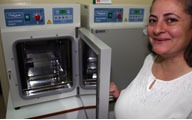
Fostering Sustainable Growth, Reducing Poverty
Since 2005, ACDI/VOCA has worked to increase the competitiveness of Lebanon’s global agro-processing industry.
From 2009-2012, ACDI/VOCA implemented the USAID-funded, three-year, $3 million Leader With Associates Award (LWA) Lebanon Agricultural Quality Control and Certification (QCC) program. The program worked to improve and expand the processing industry and successfully accomplished its primary objectives:
- Better business services—the program improved the quality, market orientation and range of plant and laboratory services available to agro-industrial processors and producers
- More effective business models, including improved marketing efforts and increased profitability and sustainability
- Increased collaboration among local service providers and the broader agroindustry
ACDI/VOCA Analyzed Market Conditions and Improved the Environment
The QCC program started with an initial market assessment, which gathered information on the growing agro-processing industry and looked specifically at the constraints in processing laboratories, focusing on the Chambers of Commerce, Industry and Agriculture (CCIA) laboratories in Zahle, Tripoli and Saida.
The program then identified needed equipment and material upgrades to increase and improve partner lab services. The program co-invested in these upgrades with the facilities through in-kind transfers. QCC collaborated with local organizations and engineers to design plans for the physical expansion of two of the labs to increase services available and meet the requirements of ISO 17025 accreditation. ISO 17025 is an international recognition of testing competence and it provides both operational and business benefits for the labs and their customers. Immediately upon completion of the program, all three laboratories were successful in obtaining the accreditation.
Expanded Testing and Research Facilities Essential to SME Growth
The project expanded and improved the services offered by the three food-testing laboratories that function as a key business support to the small and medium-sized enterprise-driven agro-food industry in Lebanon. Testing and research facilities provide essential services to the food industry—without them it is impossible to meet buyer requirements for quality and safety or consumer demand for innovation.
Improving the current network of facilities in Lebanon was necessary to support the long-term growth of this industry, particularly as markets increasingly require compliance with international quality standards.
Food Exporters Access Technical Information and Improved Lab Services
The QCC program increased the laboratories’ and SMEs’ access to market information through trainings on export requirements—specifically those of the U.S. Food and Drug Administration—and the development of an interactive website, through which standards for major export destinations of Lebanese food businesses have been made available. The interactive online database called The Agro-products Site Directory for International Export Requirements, or TASDIER (meaning export in Arabic), is managed by the Federation of Chambers of Commerce, Industry and Agriculture (FCCIAL), which plans to update and expand the site regularly.
The program also provided significant assistance to the CCIAs in developing business and marketing plans to enable them to reach a wider range of SMEs and increase profits to become fully sustainable. By the end of the program, two of the three labs were profitable and the third held a grand opening to launch new, expanded services from its state-of-the-art facility.





